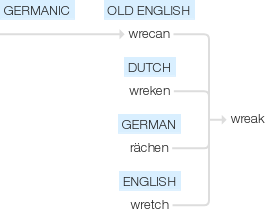Wreak
Old English wrecan ‘drive (out), avenge’, of Germanic origin; related to Dutch wreken and German rächen ; compare with wrack4, wreck, and wretch.
wiktionary
From Middle English wreken, from Old English wrecan, from Proto-West Germanic *wrekan, from Proto-Germanic *wrekaną, from root *wrek-, from Proto-Indo-European *wreg-(“push, shove, drive, track down”). [1] Cognate via Proto-Germanic with Dutch wreken, German rächen, Swedish vräka; cognate via PIE with Latin Latin urgere (English urge), and distantly cognate with English wreck.
From Middle English wreke, wrake, Northern Middle English variants of wreche, influenced later by Etymology 1, above. Compare Dutch wraak.
etymonline
wreak (v.)
Old English wrecan "avenge," originally "to drive, drive out, punish" (class V strong verb; past tense wræc, past participle wrecen), from Proto-Germanic *wrekanan (source also of Old Saxon wrekan, Old Norse reka, Old Frisian wreka, Middle Dutch wreken "to drive, push, compel, pursue, throw," Old High German rehhan, German rächen "to avenge," Gothic wrikan "to persecute"), from PIE root *wreg- "to push, shove, drive, track down" (see urge (v.)). Meaning "inflict or take vengeance," with on, is recorded from late 15c.; that of "inflict or cause (damage or destruction)" is attested from 1817. Compare wrack (v.). Related: Wreaked; wreaking.
